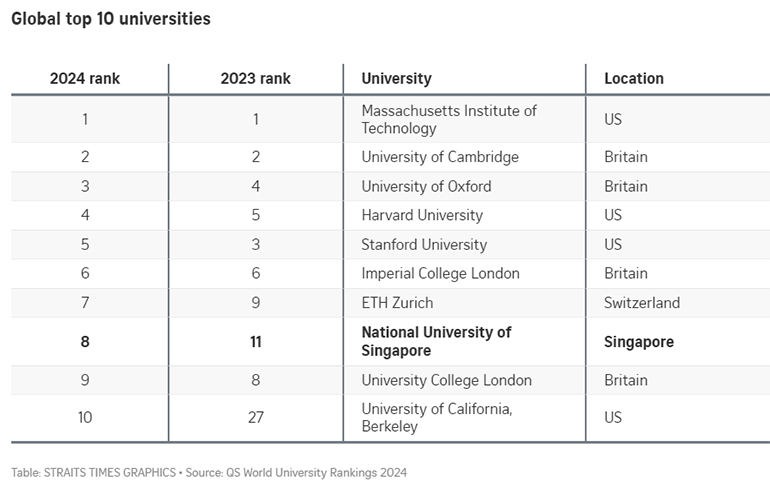It is the highest-ranked Asian university and the first from Asia to be placed among the top 10 in the table, which is dominated by universities from the United States and Britain.
The chart is topped by the Massachusetts Institute of Technology, as it was in previous years, followed by the University of Cambridge and University of Oxford.
Harvard University is fourth, and Stanford University fifth.
The latest QS ranking is the 20th edition and features updated methodology using three new metrics – an institution’s commitment to sustainability, employment outcomes, and international research network.
QS has also made some changes to the weighting of some existing indicators: academic reputation, employer reputation and faculty-to-student ratio.
For example, academic reputation is now worth 30 per cent, down from 40 per cent, while employer reputation is accorded 15 per cent instead of 10 per cent previously.
NUS came in seventh for employment outcomes and 15th for academic reputation. It ranks 54th globally for employer reputation and 64th for citations per faculty, which measures research impact.
In a statement, NUS President Tan Eng Chye said: “This is a historic first for NUS to be placed within the top 10 globally, amongst many other prestigious institutions worldwide.
“This is a testament to our capabilities and commitment to providing a world-class and interdisciplinary education to nurture agile and resilient graduates with diverse skills and knowledge for an ever-changing world.”
He added: “This achievement was made possible by the excellent contributions and outstanding work of our talented faculty, staff and students who remain deeply committed to flying the flag of our distinguished quality of education and creating positive impact in the classroom and beyond.”
QS Chief Executive Jessica Turner said: “This unprecedented milestone marks a remarkable moment for Asian higher education and showcases NUS’ dedication to research excellence, innovation and sustainability.”







